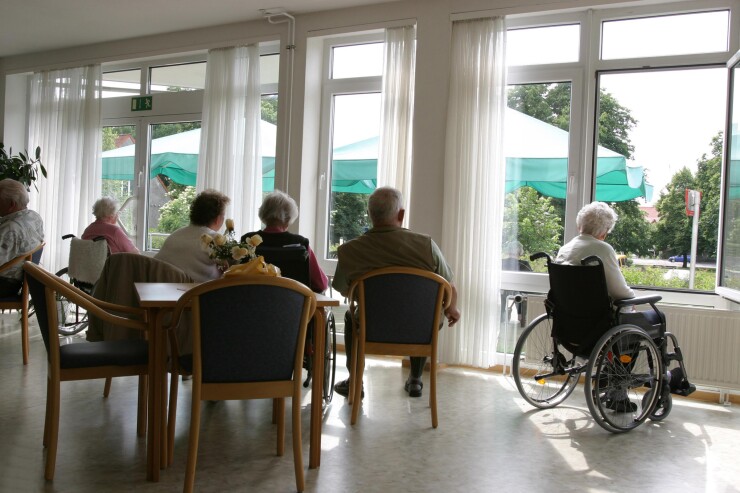The Internal Revenue Service told nursing homes and other care facilities Tuesday that they shouldn’t be seizing their residents’ economic impact payments.
The warning comes amid reports that some facilities have been taking the payments and claiming they belong to the nursing home and not the patient, especially if they are receiving Medicaid. The IRS made clear that the stimulus payments, which provide upwards of $1,200 for individual taxpayers and $2,400 for couples under the CARES Act, belong to the recipients and not the organizations providing the care.
The reminder comes after complaints from lawmakers, the Federal Trade Commission, patients and their families that nursing homes and other businesses may be taking advantage of vulnerable populations who were entitled to receive the payments, telling them the money was needed to defray the cost of providing care to Medicaid patients.
“The payments are intended for the recipients, even if a nursing home or other facility or provider receives the person’s payment, either directly or indirectly by direct deposit or check,” said the IRS. “These payments do not count as a resource for purposes of determining eligibility for Medicaid and other federal programs for a period of 12 months from receipt. They also do not count as income in determining eligibility for these programs.”
The Social Security Administration has issued a set of
The IRS also observed the economic impact payments don’t count as resources that have to be turned over by benefit recipients, such as residents of nursing homes whose care is provided for by Medicaid. The economic impact payment is considered to be an advance refund for 2020 taxes, so it’s considered to be a tax refund for benefits purposes.
The IRS said the language in the Form 1040 instructions apply to economic impact payments: “Any refund you receive can't be counted as income when determining if you or anyone else is eligible for benefits or assistance, or how much you or anyone else can receive, under any federal program or under any state or local program financed in whole or in part with federal funds. These programs include Temporary Assistance for Needy Families (TANF), Medicaid, Supplemental Security Income (SSI), and Supplemental Nutrition Assistance Program (formerly food stamps). In addition, when determining eligibility, the refund can't be counted as a resource for at least 12 months after you receive it.”
The Republican and Democratic leaders of the Senate Finance Committee recently complained about the diversion of the payments. Senate Finance Committee chairman Chuck Grassley, R-Iowa, and ranking member Ron Wyden, D-Ore., wrote a
They noted that the Federal Trade Commission’s Elder Justice Coordinator recently
“On May 15, 2020, the FTC alerted the public of reports that some nursing homes and assisted living facilities had improperly taken Economic Impact Payments from residents enrolled in Medicaid program,” Grassley and Wyden wrote. “Some residents reportedly were advised that, due to their status as Medicaid recipients, their Economic Impact Payment was a resource owed to their nursing home or assisted living facility, according to the Iowa Attorney General. Similar reports have emerged in states such as Oregon, where the Oregon Attorney General released a ‘Scam Alert,’ warning of similar reported incidents and characterizing the confiscation of the checks as ‘unlawful.’”
House Ways and Means chairman Richard E. Neal, D-Mass., and House Energy and Commerce Chairman Frank Pallone, Jr., D-N.J., also
“As you know, long-term care facilities have been the epicenter of the COVID-19 pandemic, representing an estimated one-third of COVID-19 deaths nationwide and more than one-half of deaths in some states, including Massachusetts and New Jersey,” they wrote. “It is crucial that this vulnerable population group continues to have the certainty that comes with these EIPs and are not coerced into wrongly handing over their checks for fear of being kicked out of their homes.”
Nursing homes and other senior care facilities have come under fire in recent months for not doing more to protect their residents from the ravages of the coronavirus. The number of deaths tied to COVID-19 at such facilities is estimated to surpass 50,000 in the U.S. alone, accrdording to
More information about EIPs and representative payees involving Social Security and Supplemental Security Income benefits can be found at






